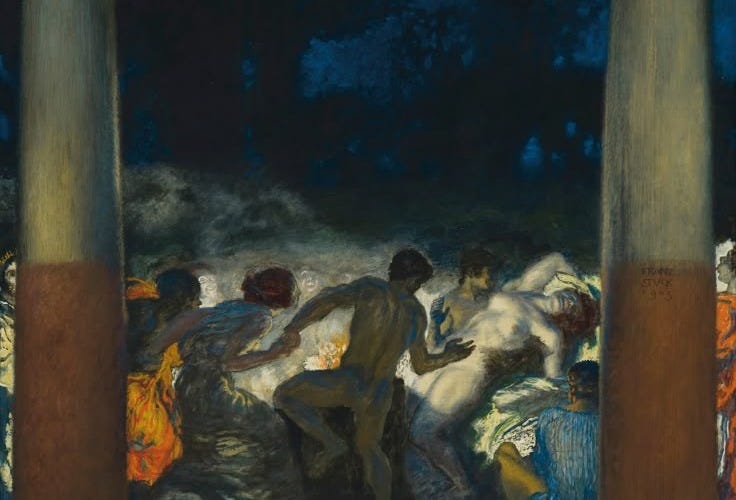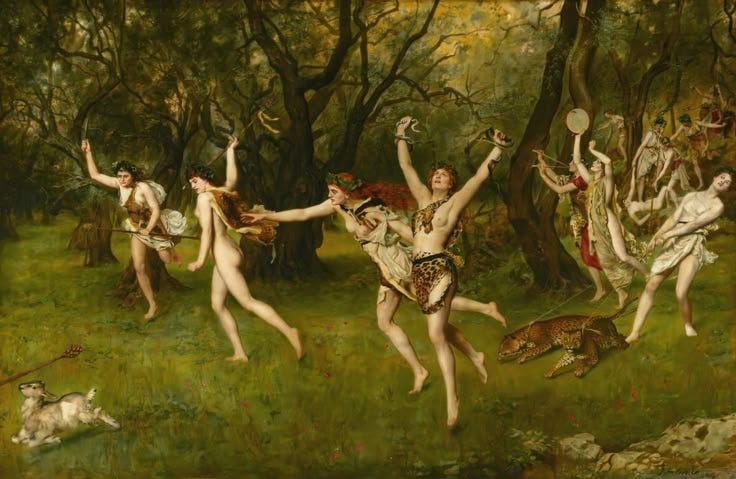NOTES FROM DRY JANUARY//THE APOLLONIAN VERSUS THE DIONYSIAN1
Mid-January:
I have not been drinking alcohol. People ask how it is, and I say ‘totally fine’. Suddenly, in a not-insomnia way, nighttime is daytime. Both, sober. My primary interest has been in hibernation.
As a person who, outside of this month, is open to dabbling in wine and martinis, I realize I have consumed a strange amount of Sober literature and media. This feels like an accident of being interested in how to feel better. Jung (my prince) and Bill Wilson (the founder of AA) were intellectual correspondents, after all. Schools of thought are neighbors. I also have read some Allen Carr and am moved by writing about sobriety, like this and this! I joke that I love the Sobers, but for real – there is a frankness around living in the material world that I find sobriety allows and encourages. To me, this is thrilling, expeditious, and often charming.
“Modern Man threw a brick through his window in order to sell himself a burglar alarm”, wrote Allen Carr in his Easy Way to Control Alcohol. Which is a bit much, if you ask me. But he makes a point. One material agitation begets another. For me, in the absence of alcohol, something new has popped up: I am now 100% addicted to sugar!!!
I’ve always had a sweet tooth, but about five days into this month, something in me growled, grew, and changed. Suddenly, I needed desserts often, and in a profound way. No dessert = despair. Writing this, I keep trying to employ some mention of dopamine to describe this new yearning, but it ends up sounding too medical and sanitized. The sugar urge – though chemical – feels carnal.
Or somehow sacred. I think of Dionysus, the Greek God of Wine and Ecstasy. I feel less alone. He would understand.
Most would attempt to regulate, I imagine. Just ignore the craving! But I find that negation activates weary ghosts. What I mean to say is that self-denial, even with the best of intentions, can feel more sinister than generative. If you are someone who has ever denied yourself food — and then, perhaps, stopped doing so — you might understand how complicated this is. Because of the investment I once had in fearing and coveting desserts, I have found that I appreciate the thrill of a sugar craving, and then the audacity of honoring it. I am protective of this desire, so impressed by its insatiability that I want to respect it.
Still, enough is enough and I need to keep my teeth. I try to consult psychosocial wellness sources. I find that The Deep Craving of Some New Indulgence in Response to Eliminating an Original Pleasure Thing is a well-worn chapter in the Wellness Archives. What to do about a new vice, when the other is kept at bay? Especially when it is something like sugar, which is definitely evil but also totally fine? Allen Carr, the writer I quoted earlier from his Easy Way to Control Alcohol also wrote two books on quitting sugar. Hmmmm! I say to myself.
Such a funny practice: to study avoiding something, and then avoiding something else. Feels a little like Whack-a-Mole. Is there an Easy Way to Control Anything?? Should there be?
As I research my Adorable Little Insane Sugar Addiction, I keep coming across ways to helpfully ‘trick the body’. This mostly means using your brain to follow a protocol where you substitute a better thing for a bad thing, two steps ahead before the somatic system knows the difference. Drink water and the body can be fooled to fullness. Eat berries and the body can be fooled to cake-ness.
I am pro-this idea when it comes to calming the nervous system or like… acclimating to jet lag. But when it comes to cravings, something feels off.
I find it hard to trick myself. Coming up with a plan of how to do so takes some forethought, and I begin to wonder who is fooling whom. Berries are not cookies and yogurt isn’t ice cream. I even tried a protein pop-tart, which I knew would feel like attempting to hold the hand of a limp and cloying ghost.
All of this, to me, is an attempt to use the Apollonian to reckon with the Dionysian. Let me explain:
Apollo and Dionysus were both sons of Zeus. Apollo was Dionysus’ brother. Apollo was the god of many things — among them: the Sun, rational thinking and order, logic, prudence, reason, and purity. Dionysus (as I mentioned) was the god of wine, dance, irrationality, chaos, passion, and instinct.
We can use different words to delineate the essences of both gods’ domains: Order versus indulgence, super-ego versus id, control versus restraint, logic versus emotion.
I become obsessed with qualifying things as one or the other. It’s kind of fun. An example:
Urge for cookie = Dionysian
Learning to make cookies well, better each time = Apollonian
The Dionysian, in my brain, looks like this:
The Apollonian, in my brain, looks like this:
Both very fabulous!
Nietzche argued both were necessary for creative genesis and wrote, in The Birth of Tragedy: “The Apollonian energy makes everything beautiful and worthy of living” while “The Dionysian shows itself as the eternal and original power of art.”
There seems to be some open space in Nietzche’s interpretation, too, of the two gods as Dream and Intoxication. If this month forgoes intoxication, what levity does the Apollonian dream allow?
If the body is mysterious, chaotic, urgent, then it would make sense why attempting to work with it through an Apollonian technique of logic (tricking the body into fullness, etc) would invite some dissonance. Or, maybe I am weird and just have a strange affection for my own poor self control.
Best, instead, to look to others for guidance. Anne Carson, in her interpretation of “The Bacchae”:
“Dionysus does not explain or regret anything…
The desire, before the desire,
The lick of beginning to know you don’t know.”
Perfect! Santé!
I worked on this throughout last month, in a jotting sort of way. Each time, after reading the jots, I experienced the familiar thought of ‘this all doesn’t really matter, when the world is in such upheaval!!’
Then, the other part of my brain responded: ‘Well! it’s literally… what we’ve got right now!!’
An interest in mundanity can feel like an oasis. Don’t think I don’t know that there’s other stuff out there, too. There’s just this, too.








